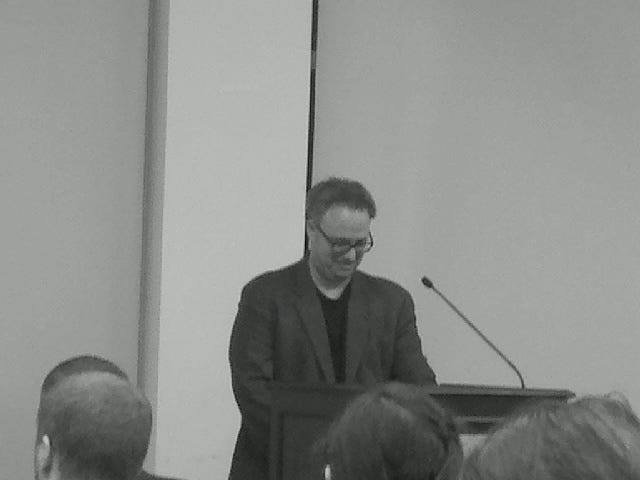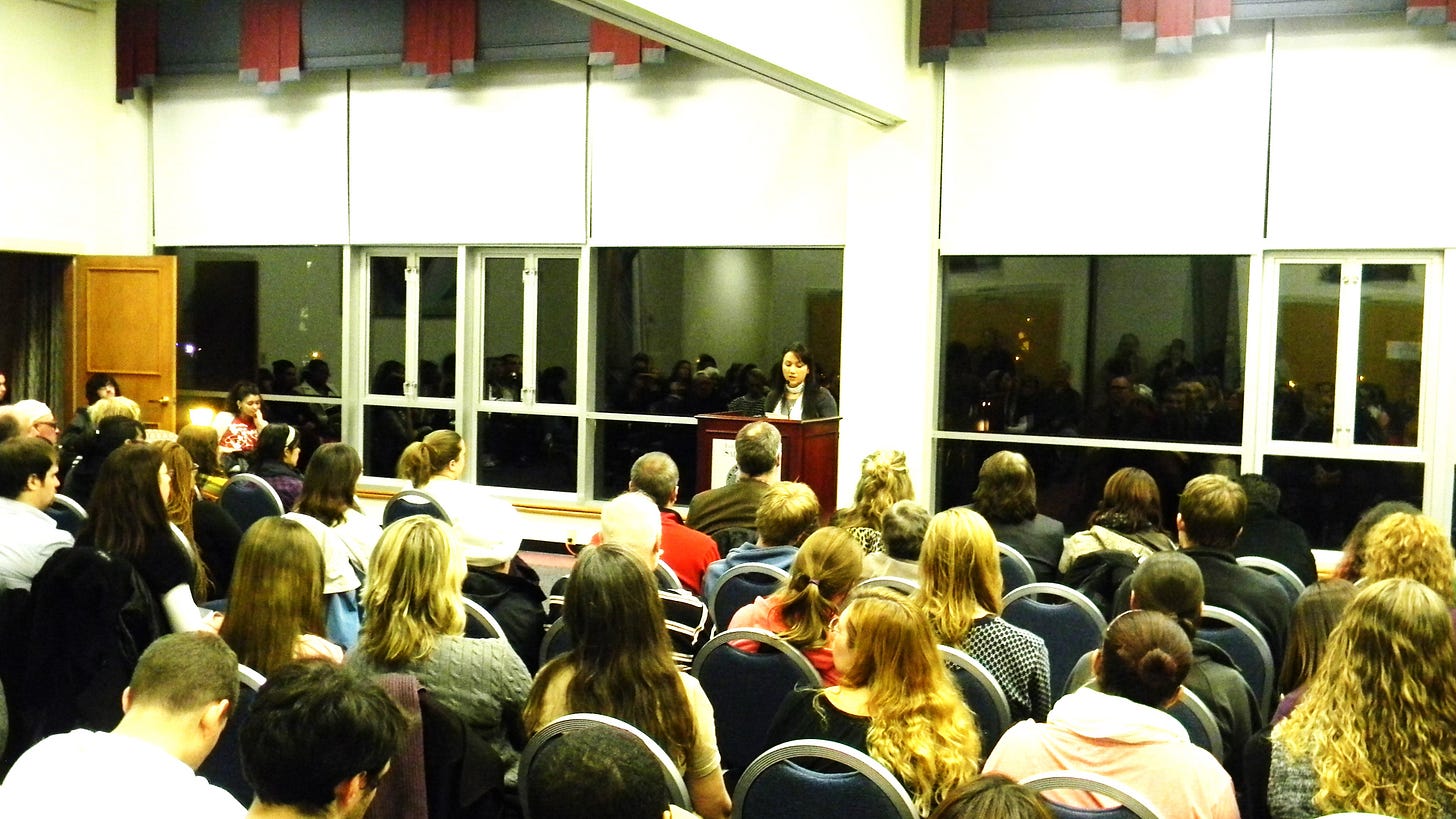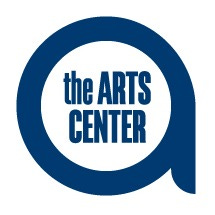What We Talk About When We Talk About Towns and Gowns
Do I regret bringing all these writers to campus? No. I feel gratitude.
Lately I’ve been working at my desk job—which is working out great, by the way, I’ll get to that at some point—and also arranging for a couple of events in my area.
I think I mentioned how I got a grant over the summer? I never get grants. I am not the grant-getting type. Getting news about the grant so close to losing my job and my mom dying, it didn’t feel real, since nothing really felt real.
I applied for the grant five days before my mom died. Then I forgot about it.
It’s called an Arts Thrive and Grow Grant and I’ll put the info on the bottom of the post. What I proposed, I had to remind myself, is to publish some writing from my project, which I’ve called “Here’s Where The Story Ends,” and present a couple of readings of new work, all by the end of the year.
It feels rushed, to be honest, but it’s all happening.
It also makes me remember the years as a professor, putting together reading series and bringing guests on campus.
This post reminisces a little about putting readings together at my college. I got pretty good at doing it. Like Liam Neeson’s character in Taken says, I don’t have any money, but what I do have are a very particular set of skills.
If you’re in the great Albany region, mark your calendars for the first of these grant-funded readings Thursday, Oct. 7, when I will be presenting work adapted largely from this Substack at MopCo, the improv theater in Schenectady, NY. If we’re friends on social media, you’ve probably gotten an invite. I’ll be joined by two former students, Brett Peterson and Sarah Michelle Sherman, who will read work.
This time last year, I started to go to MopCo’s Monday night improv classes. I did it because I never took an improv comedy class, but also because I knew I'd be terrible at it.
I also wanted to take my mind off the immense stress at work from fear that my college would close and my job would go away.
I was, in fact, terrible. It was hard to listen and react and not get out of my own head. I did monologues when I should have just said, like, two words, and would have killed. I played games with other full-grown adults in a room with a plaque on the wall with two words: DO LESS.
I also took notes, from other students as well as Michael, our excellent teacher.
One quote: “Dare to be mediocre.”
Another: “We get reinforced for our bad habits.”
A third: “Everything is an Offer.”
The class was more than a distraction for me--it felt like a cross between church and therapy. I felt like I was out in the world not as a professor or a writer, but just another improviser. It would turn out to be good practice.
As for the college and the job? Well, we all know how all that played out. It will be a thrill to debut some new work here.
Hope you can come. Not all of it will be depressing, I swear.
Let’s begin with our Substacking, shall we?
It’s a Thursday night in April more than a decade ago, and I am teaching a poetry in performance class. It was my favorite class for years, in part because I got to bring in guest writers, poets, and also combine it with the reading series I ran.
(Rant/aside: Those readings kicked the New York State Writers Institute’s ass in attendance for the better part of 10 years, all on a $5000 budget.)
I did a tally once of how many events I put on over the 18 years at my college and lost count at 75. If you count student-only events like open mics, that number would be higher.
I once was going to write a piece called “Confessions of a College Reading Series Coordinator” and it ended up being, like, four sentences:
Be kind to the readers.
Pay them.
Feed them.
Buy their books.
I tried to bring in local writers as well. The thing about a small city like Albany is that, among writers, poets mostly, there exists a large, stupid, provincial, artificial division between non-academics and academics.
“Town and gown,” it’s called.
You can guess the stereotypes here, but in Albany it’s almost cartoonish: non-academics attend the University of Real Life and only go to the sparsely attended open mics they set up in the backs of bars, while academics lived in ivory towers and only go to sparsely attended theoryfests they set up in dark wood-walled auditoria.
Both stereotypes have nuggets of truth, and both need to go away. The town poets who railed about academe rarely weren’t college grads themselves from comfortable backgrounds, while the gowners professors were often from underprivileged or under-represented backgrounds and also needed to get out more and engage more with the community at large.
This, I want to assure civilians unfamiliar with academic life, is a real thing.
Years ago, as a relative newcomer to living in a small city and having a tenure track job, it was jarring to meet local writers who seemed to think I was some kind of priest, all because I taught a 3/3 load at a teacher’s college up the road.
So when I reached out to the local writers, lots were a little strange or overweening about coming to visit a real college class.
“I’m not sure I was feeling what that dude was saying,” Jarred, one of my brightest students, said as our Thursday class began. “How can he just say slam poetry isn’t poetry?”
Jarred was talking about a local poet who visited our class the previous week, a self-appointed head honcho poet dude of the area. I knew he was a hippy who ran readings, was maybe a little grumpy and opinionated. But nothing changes your perspective about someone more than when you put them in front of 20 19-year-olds.
That week, we were covering slam poetry and were getting ready for our midterm, which was a reading in the student center. And someone asked our guest what he thought about slam poetry—who his favorite slam poet was. He laughed.
“When a poet takes an ‘I’m more oppressed than you” stance, that’s not a poem,” he said. “It’s an attitude.”
He rattled off other things he didn’t like about slam poetry: the “hip hop cadences,” the playing the race card, the loud delivery. And, the worst, trying to be funny.
As he rattled off his long list of remonstrances regarding slam poetry, I looked out to my class—a diverse, idealistic bunch. I felt my face warm. The air in the room quickly went stale.
To try to recover, I did what I usually do [sorry, did, since my teaching career is over], which is make a joke, and concentrate on something. So I made some corny joke about taking a coffee break, which we did, and when we returned our guest read some poems. Then I let the class out early.
The next week, we did what classes do: we discussed, or “unpacked,” our previous class, and what our guest had said about slam poetry, about poetry in general, about attitudes.
“Hip hop cadences,” one student said, clearly was some kind of racial read of how people talk and express themselves. I agreed. Was it racist? That question lingered, unanswered.
We talked about how being political in a poem is not only unavoidable sometimes, but necessary.
And we also talked about how poets have been funny ever since there has been poetry, or being funny, which is the literal beginning of time.
It was a great discussion. One that transcended, I daresay, the quality of the class visitor.

I did tell the class that the reason I let the class leave was because I suddenly felt protective of them. They were putting together slam poems, after all, and a lot of them were musical, hip hop-influenced, political. And funny. Most of the students would be pretty loud when the midterm performance happened. They were loud because they needed to be. People need to listen sometimes.
I told the class I let them out early because I could not, would not allow my students to perform in front of our guest. Period. I didn’t want this person to say what they were performing wasn’t a poem.
This wasn’t the first time I felt protective of my students, but it’s one I can remember so clearly, and I think one reason is I have now crossed over back to the world of not-academic, and am wondering how to navigate the town-and-gown worlds without a roomful of students to protect and teach and learn from.
There would be times when our Thursday class would get into 4-5 cars and drive to some reading and I don’t think I’ve ever had so much fun.
It was on these trips I learned about mumblerap, Ugg boots, what thirsty and extra and on fleek means. How am I going to keep up with this, now that it’s over?
We experienced some of the greatest readings by writers at nearby colleges or arts centers. We also endured some of the most mind numbingly boring readings.
We signed up for open mics at coffee houses and cheered on musicians and put up with crowd work by stand-up comedians.
I bought everyone a coffee and a pastry and it was the best 70 bucks I ever spent because they were happy to get off-campus and perform.
A couple of times someone at my college would strongly suggest a friend to come and read, and usually I’d make it happen. I’d ask if they would do the introduction for them. “Writing an introduction” really means reading the person’s bio and maybe adding one or two sentences about why this person is terrific.
Except for two times I distinctly remember, the colleague would always politely decline doing an intro.
“You’re so good at this,” they’d say.
What I was good at, I’m still not sure, except for running around and organizing things, fueled by enthusiasm, coffee and Imposter Syndrome. In that order.
The positives from the events themselves, always, always outweighed the negatives.
My students were mostly from outlying towns and had never seen a slam poet. They would get to meet them in class and absolutely destroy some space on campus with just a microphone and their wits.
They might meet a writer they would never otherwise meet in real life with a perspective completely different from their own.
Or—my favorite—they might see a version of their future self, fully realized.
One year I arranged to have Melissa Febos come to campus. Febos had just published her first memoir, Whip Smart, about her life as a dominatrix.
One of my star students. who was raised a non-denominational Christian, told me she wasn’t allowed to bring the book home, but she found a way to read it anyway. Another student, also a Christian, wasn’t super-into the whole BDSM angle of the book, but found her way into the book through one client in the book who wore a fully knitted sweater suit to his sessions. The student was a knitting enthusiast, you see, when Febos visited the class, came with a list of yarn-based questions.
Another guest writer I brought on campus, one of the first back in 2006, was slam pioneer Regie Cabico, who taught a full-on performance workshop with a class before reading to 100-plus people in the student center.
As part of a performance, he handed a flavored condom to an audience member. It was the college president. He did not know he was the college president. I did.
I think about these writers and so many more and it does strike me now how risky bringing some of those writers on-campus was. Maybe, on some level, I was an academic who went about the job in townie, non-academic ways.
Or maybe I just wanted to fuck shit up.
But that’s just self-mythologizing. The real reason I was so into having readings and guests is that it was necessary for these conversations to take place—not just for the students, but for writers, too.
I also needed all the help I could get to make an impact, especially when I first began teaching.
Was putting together these guest lectures a pain in the ass? Yes, yes it was.
Did I get paid for setting up readings or get any course release? Nope and I did not.
Do I regret bringing all these writers to town?
No. I feel the opposite. I feel gratitude.
Here’s information about that grant.
Arts Thrive and Grow has been funded by New York State, Kathy Hochul, Governor. We thank Senate Majority Leader Andrea Stewart Cousins for her extraordinary commitment and leadership, and our elected officials who represent our grantmaking region: Senators Jake Ashby and Neil D. Breslin; Assemblymembers Scott H. Bendett, Patricia Fahy, John T. McDonald III, Angelo Santabarbara, Phil Steck, and Mary Beth Walsh.
Thank you for reading, as always. I apologize in advance for any typos. They drive me crazy when I spot them after I send this out.
Or maybe just buy me a coffee.









Congrats on the grant!
I love slam poetry. I also love Melissa Febos!